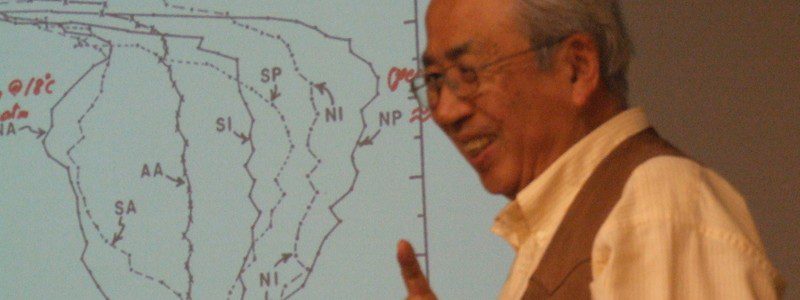Originally presented 19 Mar 2016
Workshop funded in part by NOAA Award Number NA15NOS0080223 through the National Ocean Service
We are honored to welcome back to E2C Dr. Taro Takahashi, the Ewing Lamont Research Professor and one of the world’s most prominent investigators in the field of Geochemistry. For more than six decades, Dr. Takahashi has investigated the Carbon Cycle, especially the behavior of carbon dioxide in the ocean. His work has contributed significantly to crucial questions and answers in understanding global climate change.
In this program, Dr. Takahashi will share results of recent research results that advance these understandings.
View Dr. Takahashi’s Slideshow
Learn more about Dr. Takahashi and the LDEO Carbon Dioxide Research Group
Here are links to some news stories about Dr. Takahashi’s research:
| New Global Maps Detail Human-Caused Ocean Acidifcation | The Southern Ocean Is Breathing in Carbon Dioxide at a Healthy Rate |
| Taro Takahasi Wins Top UN Award for Environmental Leadership |
Selected NOAA Education Resources

Videos and Podcasts:
| “Ocean as a Lab: Ocean Acidification” | “The Acid Test” |
| Podcast: “Making Waves Episode 8 Ocean Acidification” | NOAA Marine Debris Program video: “Trash Talk” |
Classroom Activities:
| Data-in-the-Classroom: Understanding Ocean Acidification” | Sea Water Acid-Base Chemistry and Ocean Acidification |
| Digital Explorer Ocean Acidification Blog |
Essential Principles and Concepts
Selected NGSS Alignments
Disciplinary Core Ideas (DCIs):
ESS3.D: Global Climate Change
Through computer simulation and other studies, important discoveries are still being made about how the ocean, the atmosphere, and the biosphere interact and are modified in response to human activities.
ESS2.D: Weather and Climate
Current models predict that, although future regional climate changes will be complex and varied, average global temperatures will continue to rise. The outcomes predicted by global climate models strongly depend on the amounts of human-generated greenhouse gases added to the atmosphere each year and by the ways in which these gases are absorbed by the ocean and biosphere.
Science and Engineering Practices (SEPs):
Using mathematics and computational thinking
Constructing explanations and designing solutions
Engaging in argument fromevidence
Crosscutting Practices:
Cause and effect
Systems and systems models
Stability and change
Nature of Science:
Science addresses questions about the natural and material world.
Science is a human endeavor.


